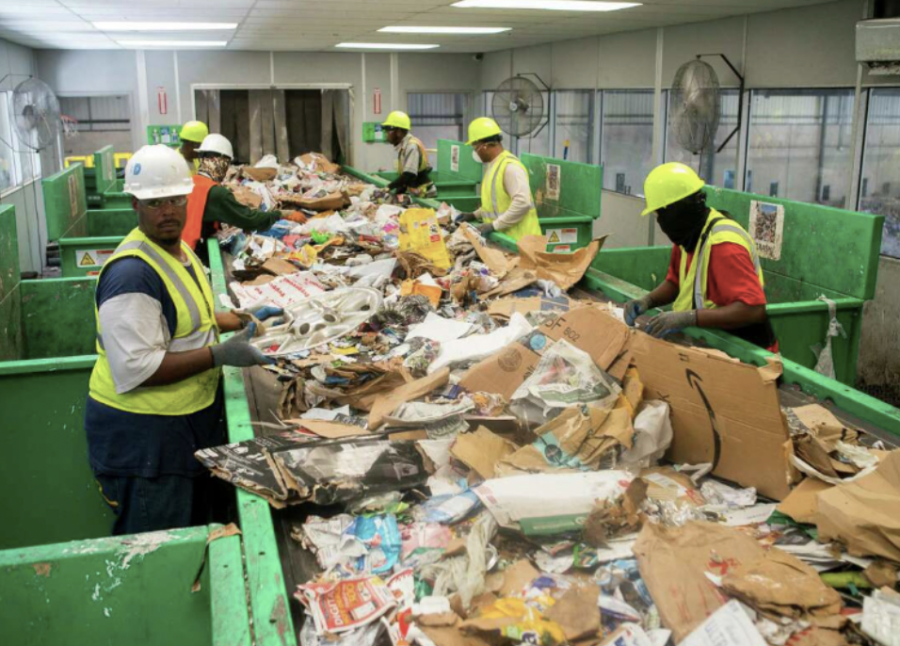Pitfalls of the Recycling System
Mark Mulligan, Houston Chronicle
One of the extensive steps taken at a Houston Recycling facility: sorting.
March 22, 2023
America produces an immense amount of garbage. Approximately five pounds of trash are generated per person daily. On average, Americans throw away about 1,200 pounds of organic garbage each year, only recycling about 67.2 million tons out of a possible 267.8 million tons. Our system of consumption and disposal results in the waste of precious resources and pollution that threatens our health, environment, and the global climate. Furthermore, Houston is one of the most wasteful cities in the United States. With a recycling rate of about 19 percent, Houston falls 15 points below the national average of 34.7 percent. The most startling fact is that many people are unaware of these facts or about proper recycling protocols and therefore do not understand the detrimental effects the flawed system has on our planet and the severity of the situation.
The sorting process at the city of Houston’s recycling facilities is complicated and oftentimes ineffective. Despite processing more than 95 tons of material every single day at places such as the Houston Resource Renewal Center in northeast Houston, items still find themselves at the landfill across the street. In 2019, KHOU 11 reported that the City of Houston sent at least 2.6 million pounds of recyclables to the landfill, breaking its own recycling rules in the process. Although the local government is working to resolve these issues, the public is largely left in the dark when it comes to where their recycling really goes.
Kelly Hess is CEO of CompuCycle, Houston’s first and largest certified electronic recycling facility and processor. She says that while electronic recycling itself is an unfamiliar system for many, CompuCycle can do great work for civilians and corporations when it comes to “responsibly and securely” recycling materials. Hess says that CompuCycle serves as a “recycler for recyclers” by “providing safe, secure, and responsible End-Of-Life IT electronics recycling practices, destroying [their] clients’ confidential data, protecting the environment, and ensuring clients ’ IT electronic equipment is managed responsibly and professionally throughout the entire process.”
At CompuCycle, there is “no further downstream,” meaning that when materials enter their facility, they are turned back into raw materials, which is sadly not the same reality for trash processed by many Houston-owned facilities who either give their unprocessed waste to companies like CompuCycle or send it directly to the landfills.
People often rely on recycling systems as a catch-all when oftentimes, only certified companies like CompuCycle are fully and properly recycling their items. Hess revealed that there are “really no federal regulations” which conveys the federal government’s shortfall when it comes to creating sustainable and healthy policies. It is important for consumers to recognize the importance of recycling in a sustainable, responsible way with facilities like CompuCycle so that they actually know their trash is going to the correct place. This is also a challenge for Emery students who are unaware of where their recycling goes after leaving Emery’s campus.
In fact, according to facilities director Terry Nelson, the current recycling system at Emery has suffered because of the fact that “there’s no money in recycling.” In the past, schools including Emery were monetarily incentivized to recycle, but because of lack of demand and funding, this system has been on the decline. The facility Emery uses today “only [does] paper and cardboard” and only picks up one load weekly. Nelson and his team have tried to find a company for plastic and metal recycling, but the endeavor has proved difficult. The current facility is only able to pick up plastic bottles and cans if they are completely empty and dry, if not there is a $250 upcharge, which is impractical for Emery to employ. Because the recycling system in general is suffering, “it’s getting tougher and tougher and tougher” for Emery to “do the right thing.” Even so, they will “continue to make steps in the right direction.”
This starts with students first becoming more informed on recycling procedures both at Emery and at home. The blue recycling bins in many classrooms can actually only be used for paper and cardboard products, but metal or plastic should not be disposed of in these bins; they can actually compromise the paper and cardboard that the facility can recycle, especially if they have remnants of any food or liquid. Students aware of the procedure should share the information with their peers and ensure that Emery does the best they can to do their part, even in a limited system. At home, there is more opportunity to recycle other materials. Bellaire, West University, and Houston each have guidelines available for reference online that tell people which items can be recycled and how to do it.
While every individual has an obligation to recycle, it’s also important for people to realize that the system is not an end-all-be-all: a reality people can only comprehend when looking at the relevant information. Whether the lack of education about recycling at Emery, in Houston, and in America stems from inferior communication from the government or scarce interest from civilians, it reveals the poor efficacy of the system as a whole. Ultimately, it is up to the people to stay informed on the recycling system and to push administrations to improve these policies.
